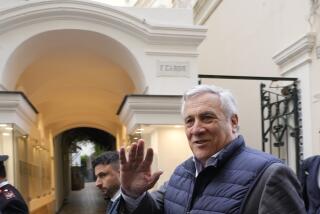Iran Issue Takes On Urgency for G-8, U.N.
- Share via
MOSCOW — A global coalition seeking to ensure that Iran does not acquire the capability to produce nuclear weapons now shows a growing sense of urgency in dealing with the issue, a top U.S. diplomat said here Wednesday after several multilateral meetings.
The coalition has not yet agreed, however, on what steps to take, the diplomat said.
Speaking after two days of talks that included representatives of the Group of 8 industrialized nations and key members of the U.N. Security Council, Undersecretary of State R. Nicholas Burns said that all participants were anxiously seeking some way of jointly pressuring Iran to rein in its nuclear ambitions.
“What’s new is, I think, a greater sense of urgency given what the Iranians did last week,” Burns said at a news conference Wednesday, referring to fresh steps in uranium enrichment announced by Tehran.
Iran says that it is seeking to master uranium enrichment technology to have a self-sufficient nuclear energy industry and that it is not seeking to develop nuclear weapons.
But the United States and other countries that met here say Iran’s actions have shown that its goal is to produce atomic bombs. Uranium enrichment can be used to produce either fuel for nuclear power plants or material for bombs.
Burns discussed Iran at a dinner meeting Tuesday with representatives of Russia, China, Britain, France, Germany and the European Union.
“What I heard in the room last night,” Burns said Wednesday, “was not agreement on the specific way forward, but on the general notion that Iran has to feel the isolation, the pressure of the international community. They have to have some cost to what they’re doing. And I felt that was a significant step forward.
“Now we need to go beyond that, and we need to actually agree on the measures that will put that into operation.”
Russia and China have argued against using sanctions to pressure Iran. But Burns, without offering any specifics, praised the stance of China’s representative at the Tuesday dinner meeting. “I was pleased by the very constructive attitude China took in the talks last night,” he said.
Russian Foreign Minister Sergei V. Lavrov used tough language Wednesday to criticize Iran, although he did not offer any details of what steps might be taken by the major powers.
“The participants of yesterday’s meeting all agreed that Iran is required to take urgent and constructive steps” in response to concerns expressed by the International Atomic Energy Agency, Lavrov said in televised remarks. “It was decided to continue contacts in various formats to carry the message across to the leadership of Iran.”
The Islamic Republic also was the main focus of discussion at a meeting of G-8 representatives Wednesday, Burns said.
“I leave here satisfied that we agree on the need to unite to dissuade Iran from its present course, that we now need to focus on the specific actions to take in the Security Council,” he said. “Everybody believes the Security Council needs to take action, which is a step forward.”
The Russian news agency Interfax reported Wednesday evening that the Iranian delegation had met diplomats from Britain, France and Germany, and had met separately with Russian officials. There were no immediate reports about what occurred at the sessions.
Iranian Defense Minister Mostafa Mohammed Najjar, on a visit Wednesday to Azerbaijan, reiterated his country’s determination to move forward with its nuclear efforts.
“The realization of Iran’s nuclear program is a sovereign right of the Iranian people,” he said in remarks carried by Russian state-run television. “Iran is continuing to develop its nuclear program for peaceful purposes in accordance with the demands of millions of Iranians.”
More to Read
Sign up for Essential California
The most important California stories and recommendations in your inbox every morning.
You may occasionally receive promotional content from the Los Angeles Times.










